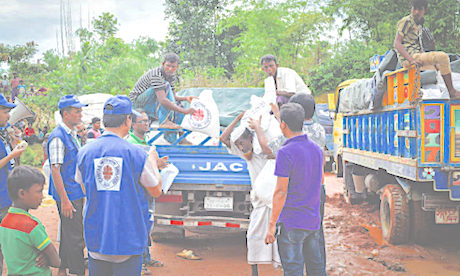Caritas Humanitarian Co-ordinator, Mark Mitchell, has just left for Bangladesh to assess the needs of Caritas Bangladesh.
They provide aid to individuals and families caught up in the Rohingya refugee crisis, as well as provide support in emergency response strategies.
Violence against Rohingya in Rakhine State escalated to a critical point, driving an estimated 671,500 Rohingya across the border into Cox’s Bazar, Bangladesh.
Mitchell stresses the complexity of this crisis, “A lasting resolution for Rohingya will surely be a long process.”
“They’re also facing flooding from monsoons and cyclones, which this area is most affected by; limited space for the camp to grow; no space for relocation; and something we haven’t dealt with before – wildlife migration.”
The Cox’s Bazar camp in Bangladesh currently sits in the middle of a migration route for wild elephants.
So far, passing elephants have destroyed shelters and other structures in addition to causing death and injury.
Mark Mitchell states, “There is an immense urgency and need for the global community to support Rohingya refugees.”
The unrelenting influx of those seeking refuge led to the construction of temporary shelters wherever there was space.
This meant that infrastructure was very poor and is only now being put in place.
Many arrived with very few possessions, some fleeing with only the clothes on their backs.
They are now reliant on humanitarian assistance for food and other lifesaving needs.
Caritas is launching an emergency appeal to support the Rohingya via improved camp infrastructure and safety for women and children.
Donating now will double your impact; the NZ government will match the donations dollar for dollar.
For more information on the Rohingya Appeal, or to make a donation, visit www.caritas.org.nz
Source
- Supplied www.caritas.org.nz
- Image: blog.cafod.org.uk
